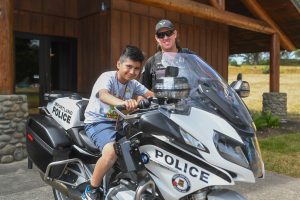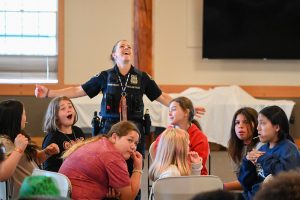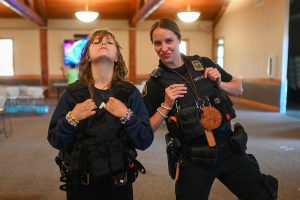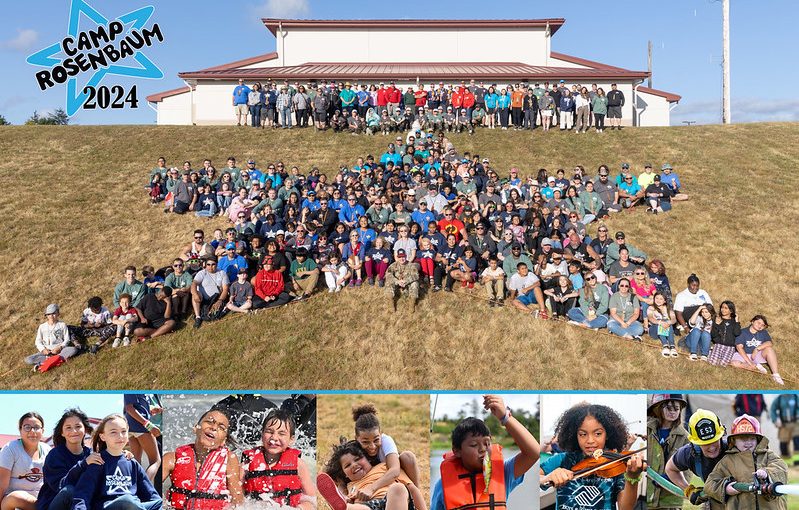Youth-focused policing is a proactive strategy that enables police to engage with youth early, aiming to reduce delinquency, crime, victimization, long-term health and criminal justice costs, and prolonged involvement in the juvenile and criminal justice systems. Camp Rosenbaum’s long-standing partnership with the Portland, Oregon, Police Bureau (PPB) and other local agencies exemplifies this strategy. For over five decades, this overnight camp and Police Athletic/Activities League (PAL) day camp have provided opportunities for low-income youth to develop positive relationships with police personnel in a safe, engaging environment.
Committed to Youth Engagement
As a proud PAL chapter, the Rosenbaum’s PPB Youth Camp connects youth ages 8–14 with local police officers, as well as high school and college coaches, for a week-long day camp. Through activities like archery, basketball, tennis, fishing, football, martial arts, cheer and dance, and arts and crafts, youth develop critical skills such as teamwork, sportsmanship, and communication. These activities are designed not just to provide recreation but to instill values that will serve campers well in school, sports, and their personal lives.
Police officers play a unique role at this camp. They are not simply authority figures enforcing rules or maintaining order; instead, they engage directly with the youth as mentors, coaches, and role models. This dynamic helps to shift perceptions of the police among the young campers. Officers participate in activities alongside the children, fostering a sense of partnership rather than authority. Through these shared experiences, the officers and youth build rapport, trust, and mutual respect, demonstrating the long-term benefits of community policing.
 The theory behind consistent police involvement in youth activities is simple but profound: When officers are present in positive, nonenforcement settings, they can build lasting relationships with community members, especially youth. This proactive approach allows officers to positively impact the lives of young people, showing them that the police are there to provide help and support, not just to intervene when things go wrong. By being present in everyday activities like sports, team-building exercises, and leadership workshops, officers demonstrate that their role is multifaceted—they are there to keep the community safe, but also to nurture its growth.
The theory behind consistent police involvement in youth activities is simple but profound: When officers are present in positive, nonenforcement settings, they can build lasting relationships with community members, especially youth. This proactive approach allows officers to positively impact the lives of young people, showing them that the police are there to provide help and support, not just to intervene when things go wrong. By being present in everyday activities like sports, team-building exercises, and leadership workshops, officers demonstrate that their role is multifaceted—they are there to keep the community safe, but also to nurture its growth.
At the Rosenbaum PPB Youth Camp, this theory comes to life. Officers are not only teaching basketball drills or helping with archery—they are also modeling positive behavior, teaching conflict resolution, and reinforcing the daily themes of teamwork and sportsmanship. These interactions create positive associations with the police, fostering a sense of trust that can carry over into the campers’ everyday lives.
Camp Rosenbaum’s Overnight Camp: A Unique Experience
Camp Rosenbaum’s overnight camp has welcomed thousands of children from low-income families, many of whom have never attended a camp, ridden a horse, gone fishing, or even seen the ocean. The camp allows children to ride horses, swim in the ocean, make new friends, and connect with positive role models. This experience, often a first for many of our campers, is made possible through partnerships with the Oregon National Guard, Portland Police Bureau, Home Forward (the housing authority of Portland), and other volunteers. These organizations work together to create a magical, memorable week that fosters the joy of childhood while instilling values of community, education, and personal growth.
 With 80 percent of campers experiencing an overnight camp for the first time, the program provides these children with the chance to explore new environments and, most importantly, build positive relationships with public safety figures. Officers and community leaders serve as mentors, guiding the campers through daily activities designed to build self-esteem, teach teamwork, and promote good citizenship in their community.
With 80 percent of campers experiencing an overnight camp for the first time, the program provides these children with the chance to explore new environments and, most importantly, build positive relationships with public safety figures. Officers and community leaders serve as mentors, guiding the campers through daily activities designed to build self-esteem, teach teamwork, and promote good citizenship in their community.
One of the most impactful components of the overnight camp is the hour-long class that every camper attends with a uniformed Portland police officer. In these sessions, officers discuss critical life choices, including the importance of staying away from gangs, drugs, and violence and making positive decisions that will help the youths achieve their dreams. These classes also provide a unique opportunity for the campers to ask questions about the officers’ jobs and gain insight into the realities of policing. Officers walk campers through real-life scenarios the campers might face in their schools or communities and discuss how to make good decisions in those situations. This interaction demystifies policing and fosters a deeper understanding and trust between officers and youth.
The relationship-building aspect of these sessions has a lasting impact. One memorable story involves an officer known as “Bulldog,” who was an instructor at Camp Rosenbaum. After the camp concluded, Bulldog responded to a call involving a missing weapon. One of the youths on the scene recognized him from camp and, feeling a sense of trust, called him over quietly to reveal where the weapon was hidden. The trust built at camp allowed this youth to approach Bulldog without fear of reprisal, knowing that the officer would handle the situation responsibly and without unnecessary consequences. This story is a powerful example of how the relationships built at Camp Rosenbaum can directly impact community safety and trust in the police.
Daily Themes Focused on Citizenship and Leadership
At the heart of Camp Rosenbaum’s overnight camp are the daily themes that guide each day’s activities and discussions. These themes—Good Citizens Work Together, Are Fair, Share, Are Loyal, Care, and Are Everywhere—are designed to teach campers the values of good citizenship and personal responsibility. Each successive theme builds on the previous ones, creating a comprehensive curriculum that emphasizes the importance of community, cooperation, and leadership.
Throughout the week, officers and other volunteers reinforce these themes in all camp activities. Whether it’s during a sports game, arts and crafts, a field trip, or a casual conversation around the campfire, the campers are constantly encouraged to think about what it means to be a good citizen in their community. These lessons resonate deeply, as the campers can see these values modeled by the volunteers they interact with daily.
The culmination of the camp week is the “big reveal,” a powerful moment when officers from all supporting police agencies, firefighters, military personnel, and housing authority partners arrive at the clubhouse in their uniforms. This event is designed to reinforce the message that the community is there to support these children, no matter their background or circumstances. The presence of so many community leaders in uniform sends a clear message: It doesn’t matter where you come from or how much money you have—the community is behind you, and with hard work and education, you can achieve anything.
This moment is often one of the most memorable experiences for the campers, especially seeing the counselors who have been with them all week in uniform and not camp clothing. The big reveal not only emphasizes that campers are valued members of the community, but it also strengthens the bond between the youth and the public safety figures they have spent the week with.
Collaborating for Community Impact

The program’s partnerships with housing authorities like Home Forward, as well as others across Oregon and Southwest Washington, are critical to Camp Rosenbaum’s mission of serving low-income families. These collaborations ensure that the programs can reach the youth who need them the most—children who may not have the financial means to attend a traditional day or overnight camp. By working closely with these housing authorities, Camp Rosenbaum is able to provide the overnight camp free to the families and the day camp at a very low rate of only $40 for the entire week. In addition to low or zero enrollment fees, the program also provides transportation at the camps and all the necessary resources to make camp an accessible and enriching experience for every child.
The impact of these partnerships extends far beyond the camp experience itself. By building strong, positive relationships with public safety figures, these youth return to their communities with a renewed sense of confidence and trust. Parents often report that their children come home more motivated, responsible, and eager to contribute positively to their neighborhoods.
Uniting Youth and Law Enforcement Through Youth-Focused Policing
Camp Rosenbaum’s programs are a shining example of youth-focused policing in action. By proactively engaging with youth in a structured, supportive environment, Camp Rosenbaum’s public safety participants help build trust and break down stereotypes that often exist between the police and low-income communities. These camps allow officers and youth to interact in ways that are not possible in traditional policing scenarios, fostering understanding and mutual respect.
The relationships formed at camp are not temporary either. Officers continue to engage with the campers and their families long after the program ends, reinforcing the importance of community policing. The youth not only gain new skills and friendships but also develop a new perspective on the police. They see officers as members of their community who care about their well-being and success.
Conclusion: A Model for Youth-Focused Policing
Camp Rosenbaum’s collaboration with the PPB, Oregon National Guard, housing authorities, and other agencies demonstrates the power of collaborative youth-focused policing. By offering both an overnight camp and a PAL day camp, Camp Rosenbaum provides opportunities for low-income youth to build positive, lasting relationships with the police. These programs not only reduce barriers but also promote trust, community engagement, and leadership development.
As policing continues to evolve, programs like Camp Rosenbaum showcase the importance of investing in youth and creating opportunities for the police to engage positively with the communities they serve. By focusing on youth, programs such as Camp Rosenbaum help build safer, more connected communities for the future.
Please cite as
Crystal Kroeller, “New Skills, New Friends, New Perspectives: Building Positive Relationships at Camp Rosenbaum,” Police Chief Online, January 15, 2025.



